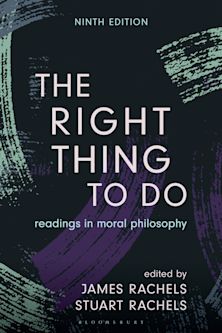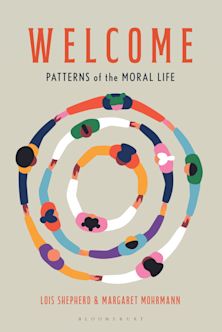- Home
- ACADEMIC
- Philosophy
- Ethics and Moral Philosophy
- Response Ethics
Response Ethics
This product is usually dispatched within 1 week
- Delivery and returns info
-
Free US delivery on orders $35 or over
You must sign in to add this item to your wishlist. Please sign in or create an account
Description
What does it mean to be a responsible subject in a world of pervasive violence? How should we be responsible witnesses in the face of gross injustice? Indeed, how should we respond to atrocities that often leave us speechless and powerless?
In this seminal volume, Kelly Oliver articulates a “response ethics” as an alternative to mainstream moral frameworks such as utilitarianism and Kantianism. Oliver’s response ethics is grounded in an innovative understanding of subjectivity. Insofar as one’s subjectivity is informed by the social, and our sense of self is constituted by our ability to respond to our environment, reconceptualizing subjectivity transforms our ethical responsibility to others.
Oliver’s engagement in various debates in applied ethics, ranging from our ecological commitments to the death penalty, from sexual assaults on campus to reproductive technology, shows the relevance of response ethics in contemporary society. In the age of pervasive war, assaults, murder, and prejudice, Response Ethics offers timely contributions to the field of ethics.
Table of Contents
Product details
| Published | Oct 18 2018 |
|---|---|
| Format | Hardback |
| Edition | 1st |
| Extent | 270 |
| ISBN | 9781786608635 |
| Imprint | Rowman & Littlefield Publishers |
| Dimensions | 9 x 6 inches |
| Publisher | Bloomsbury Publishing |
About the contributors
Reviews
-
Response Ethics employs vocabulary and concepts from poststructuralism, phenomenology, psychology, and psychoanalytic theory. Oliver draws heavily on the work of Levinas and Derrida, and responds to a wide range of other thinkers including Butler, Freud, Heidegger, hooks, Kant, Kittay, Kristeva, Lacan, Merleau-Ponty, and Sartre. Those who have interests in these philosophical methods, concepts, and thinkers, as well as those with interests in ethical theory, applied ethics, the unconscious, and subjectivity would benefit from this book. Ethics professors in particular should read this book, if only to present their students with a living philosopher active in the monumental task of working out a new ethical theory designed to address thorny current issues involving violence, identity politics, and technology.
Hypatia: A Journal of Feminist Philosophy
-
In this important collection of essays, Kelly Oliver advances, with a nod to Levinas and Derrida, an exciting new approach to ethics. Moving beyond ancient and modern traditions founded on character habits or moral rules, this emerging tradition recasts ethics as an ability to take responsibility for others in their unique singularity. But Oliver’s reflections carry her beyond contributions from major figures. Stepping back from deconstruction’s abyss of alterity, she delivers possibilities for communion. Drawing from psychoanalytic theory, she insists on responsibility for the unconscious. And alert to environmental crisis, she broadens ethics’ reach beyond our species finally to the earth itself.
Cynthia Willett, Samuel Candler Dobbs professor of philosophy, Emory University; coauthor, "Uproarious: How Feminists and Other Comic Subversives Speak Truth"
-
One of our leading voices in continental philosophy and feminist thought, Kelly Oliver brings together all of the themes of her prior work. Response Ethics is a remarkable synthesis but it also sheds new light on the very nature of what ethics should be, must be today, in “the age of spectacle.”
Leonard Lawlor, Sparks Professor of Philosophy, Penn State University
-
This rich collection of Oliver’s essays, which both articulates the philosophical basis of her original idea of response ethics and addresses crucial issues of our time, is a gift to all concerned with the issues she courageously addresses. Oliver’s work on how humans become a subject through relations with other humans allows her to make important connections between subjectivity and morality. Her work on animals shows us a different way of being with other creatures that does not fall into the dilemmas of recent post humanist literature.
Drucilla Cornell, Professor of Political Science, Comparative Literature, and Women and Gender Studies, Rutgers University



































